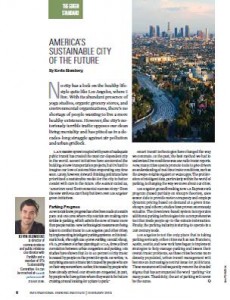No city has a lock on the healthy lifestyle quite like Los Angeles, where I live. With its abundant presence of yoga studios, organic grocery stores, and environmental organizations, there’s no shortage of people wanting to live a more healthy existence. However, the city’s notoriously terrible traffic opposes our clean living mentality and has pitted us in a decades-long struggle against air pollution and urban gridlock.
L.A.’s massive sprawl coupled with years of inadequate public transit has created the most car-dependent city in the world. Recent initiatives have accelerated the building of new transportation projects, but it’s hard to imagine our love of automobiles evaporating any time soon. Lately, however, forward-thinking politicians have prioritized a sustainable model for the city to better coexist with cars in the future. The Atlantic called us, “America’s Next Environmental Success Story.” Even the New York Post can’t help but fawn over Los Angeles’ green initiatives.
Parking Progress
As we locals know, progress has often been made at a snail’s pace. But one area where city officials are making nice strides is parking, which affects the flow of traffic more than people realize. New technological measures are being taken to combat traffic in Los Angeles (and other cities) by implementing intelligent parking systems. In his landmark book, The High Cost of Free Parking, Donald Shoup,
Ph. D., professor of urban planning at UCLA, drew a direct correlation between urban congestion and parking. His studies have shown that 30 to 40 percent of city traffic is caused by people on the prowl for spots. He writes, “A surprising amount of traffic isn’t caused by people who are on their way somewhere. Rather, it is caused by people who have already arrived. Our streets are congested, in part, by people who have gotten where they want to be but are cruising around looking for a place to park.”
Smart transit technologies have changed the way we commute. In the past, the best method we had to understand live conditions was AM radio traffic reports. Now, many cities openly promote tools to give drivers an understanding of real-time traffic conditions, such as the always-reliable Sigalert or Waze apps. The proliferation of intelligent data, particularly within the world of parking, is changing the way we move about our cities.
Los Angeles’ groundbreaking new LA Express Park program (based partially on Shoup’s theories), uses sensor data to provide meter occupancy and employs dynamic pricing based on demand at a given time. Shoup’s (and others’) studies have proven enormously valuable. The downtown-based system incorporates additional parking technologies into a comprehensive tool that feeds people up-to-the-minute information. Finally, the parking industry is starting to operate in a 21st century mode.
Los Angeles is not the only place that is taking parking seriously. Other cities such as San Francisco, Austin, Seattle, and New York have begun to implement strategies to help manage parking and lessen their overall traffic problems. As these cities become more densely populated, urban transit management will become an increasingly central issue for politicians. These measures will subsequently remove the dreaded stigma that has accompanied the word “parking” for many years. Thankfully, the act of parking will never be the same.
Kevin Blomberg is director of communications and public relations coordinator with ParkMe and a member of IPI’s Sustainability Committee. He can be reached at kevin@parkme.com or 310.451.9109.
TPP-2013-02-America’s Sustainable City

